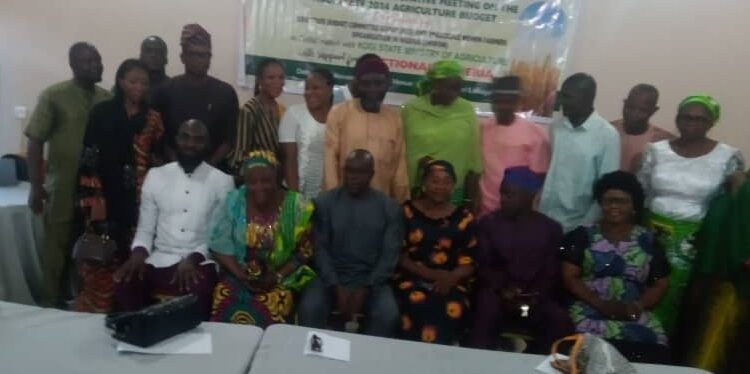Read in
As the country grapples with food insecurity, the Kogi state has been charged to judiciously invest in small-scale women Farmers in order to enhance food productivity.
In a paper presented at the one-day workshop by Azubike Nwokoye, Food and Agriculture Program Manager of ActionAid Nigeria urged the Kogi government to invest in extension services, provision of credits for women in agriculture, availability of labor-saving technology, and research and development, which would provide solutions to food insecurity and reduce unemployment in the state.
The workshop was organized by the Kogi State Budget Committee Group and the small-scale women Farmers organization in Nigeria, the Ministry of Agriculture, and with support from ActionAid Nigeria held on Tuesday in Lokoja.
He explained that if Kogi state should genuinely commit about fifteen billion naira of its budgetary allocation to smallholder farmers and agricultural value chain about 39.6 billion naira would be raked in, adding that the state is losing money due to improper investment in agriculture.
According to him, “the government is also losing money. The state is losing opportunities by not making proper investments. So we did this analysis to show states what they are losing by not investing. So in terms of percentage, it means that Kogi will generate about 69.56% in terms of internally generated Revenue then in terms of reducing underemployment and underemployment if Kogi invests 15 billion in those key areas, it means that Kogi will have about 19.66% reduction in underemployment. ” He analyzed.
He urged scale women Farmers to upscale advocacy to the Kogi state government and other institutions to get desired attention to farmers especially women Farmers for improvement of food production he said agriculture is done in the states and thus states should be more serious than the federal government, lamenting the lukewarm attitude of some states to agriculture.
The program manager appeals to the federal and state governments to urgently invest in small cutting processing and storage facilities in communities based on the commodities to own, operate, sustain, and expand by smallholder women farmers.
He said this will help address the challenges of post-harvest losses experienced by smallholder women farmers across Nigeria.
In a welcome address, the chairman of the Kogi Budget Committee Group, Mathias Okpanachi, said the meeting is aimed at stimulating development in agriculture, presentation of the 2023 agricultural budget analysis to stakeholders for comparison of what is expected of government do for the growth of agriculture in the state.
In a remark, the Kogi State Coordinator of Small-scale Farmers Organisation In Nigeria (SWOFON), Hajiya Rukayat Ahmed called for elaborate participation of women in agriculture
Hajiya Ahmed also called for the release of money meant for women in the agricultural budget to enable them to make more impacts in carrying out agricultural activities.
She maintained that women have a greater role to play in ensuring food sufficiency and economic growth of the state just like their male counterparts and needed to be encouraged.
Bello Ogrima George, Managing Director of the Kogi Agricultural Development Project, in his contributions, challenged Stakeholders to do more in the upliftment of agriculture to boost food production.
He said that Kogi is not effectively utilizing resources at its disposal to develop agriculture and solicited for government’s full participation in the Agricultural subsector.
He commended women farmers in their efforts to join hands with the government to provide enough food for the people stressing that women farmers are doing very well.
The Managing Director noted that Agriculture is of greater value to any nation worldwide as it is capable of providing employment for the Youths and boosting the nation’s dwindling economy.
Participants in the one-day engagement include; representatives of Kogi Assembly Committee on Agriculture, Small-scale Farmers Organisation In Nigeria SWOFON, Ministries of Agriculture, Budget and Planning, Commerce and Cooperatives as well as Civil Society Organisations.


